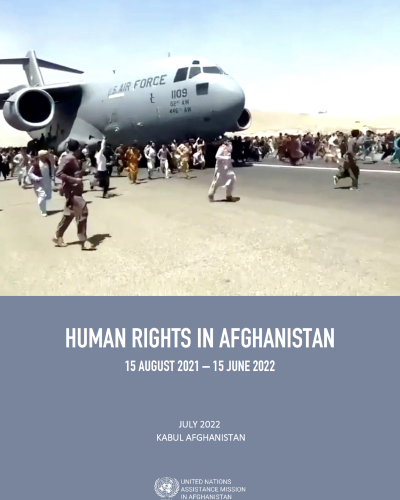HUMAN RIGHTS IN AFGHANISTAN: 15 AUGUST 2021 – 15 JUNE 2022

This report of the United Nations Assistance Mission in Afghanistan's Human Rights Service (UNAMA HRS) covers the ten-month period since the Taliban takeover of Afghanistan from 15 August 2021 to 15 June 2022. The topics reflect the human rights priorities identified by UNAMA HRS over the past 10 months and align with UNAMA's mandate, which was recently extended by the UN Security Council on 17 March 2022.
Since 15 August 2021, there has been a significant reduction in civilian harm. UNAMA has, however, recorded casualties as a result of attacks targeting civilians, often claimed by the armed group self identified as "Islamic State in Iraq and the Levant - Khorasan Province" (hereafter referred to in this report as ISIL-KP).
The human rights of Afghans - in particular, access to an adequate standard of living - have been affected by the unprecedented economic, financial and humanitarian crisis which has faced the country since 15 August and left millions of Afghans in need of humanitarian assistance.
It is noted that def acto authorities have taken some steps seemingly aimed at the protection and promotion of human rights, for example: a general amnesty for former government officials and members of the Afghan National Security and Defence Forces (ANDSF), the 3 December decree on women's rights, a Code of Conduct on system reform relating to prisoners, a directive on the use of force by de facto security officials. Monitoring by UNAMA HRS has revealed violations carried out by the de facto authorities, impacting the enjoyment of a broad range of human rights.
Since mid-August 2021, UNAMA HRS has documented persistent allegations of extrajudicial killings, arbitrary arrests and detentions, and torture and ill-treatment carried out by the de facto authorities. The human rights situation has been compounded by the measures taken by the defacto authorities to stifle debate, curb dissent and limit the fundamental rights and freedoms of Afghans. Women and girls in particular have been subjected to severe restrictions on their human rights, resulting in their exclusion from most aspects of everyday and public life. The recording of human rights violations in Afghanistan has been made more challenging by the de facto authorities' dissolution of reporting and justice mechanisms operating under the previous government to prevent and respond to these cases, such as the Afghanistan Independent Human Rights Commission and bodies dedicated to addressing violence against women. This has likely also increased the reluctance of victims to seek help or report human rights violations and violence.
UNAMA HRS has continued to gather credible and accurate reports regarding the human rights situation in Afghanistan. UNAMA HRS has continued its dialogue with the de facto authorities, advocating on reported violations and raising awareness on human rights standards.
Afghanistan as a state remains a party to a number of international human rights treaties. This report presents recommendations which aim to ensure that the obligations set out under these treaties - and the obligations owed by the de facto authorities to the Afghan population in respect of the protection and promotion of human rights - are upheld.












